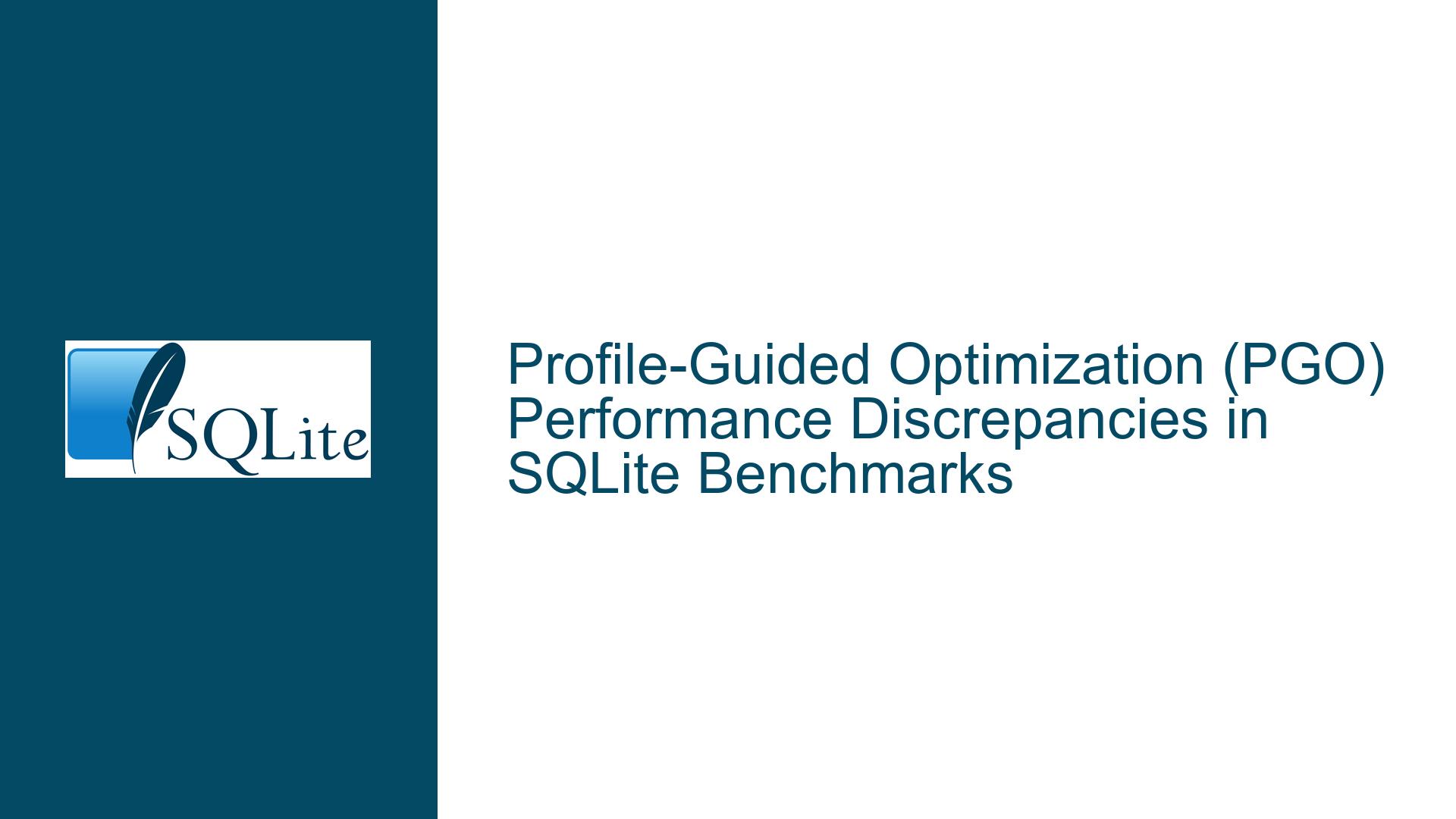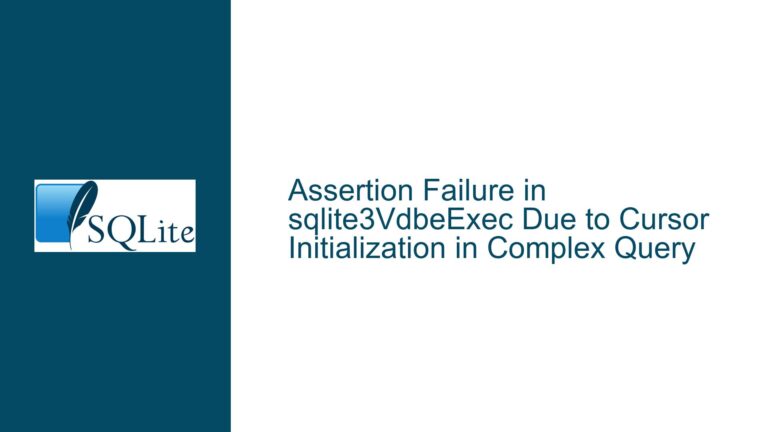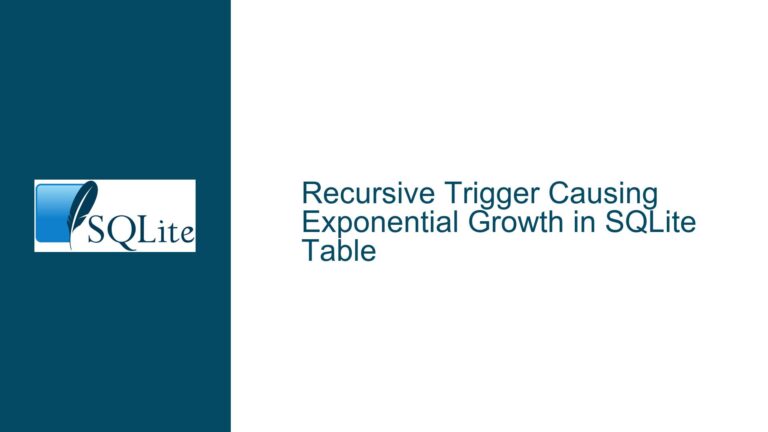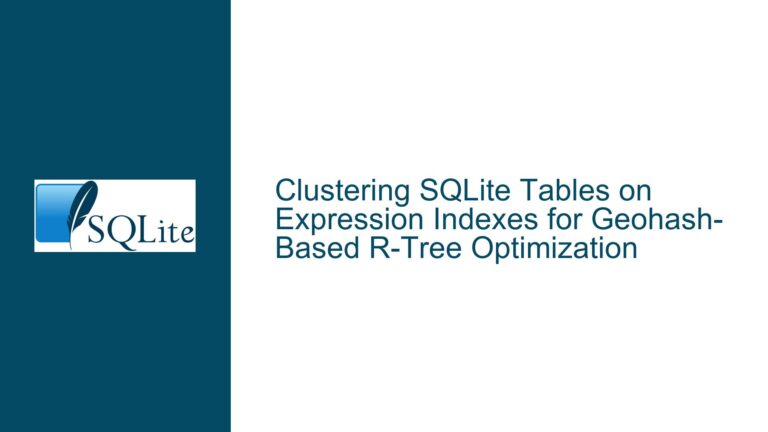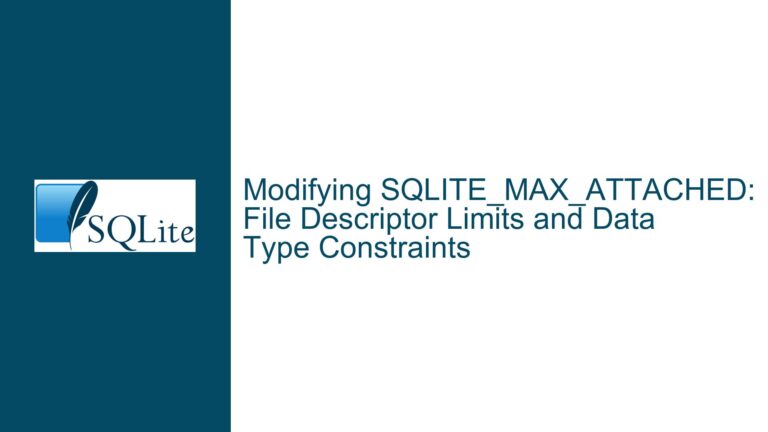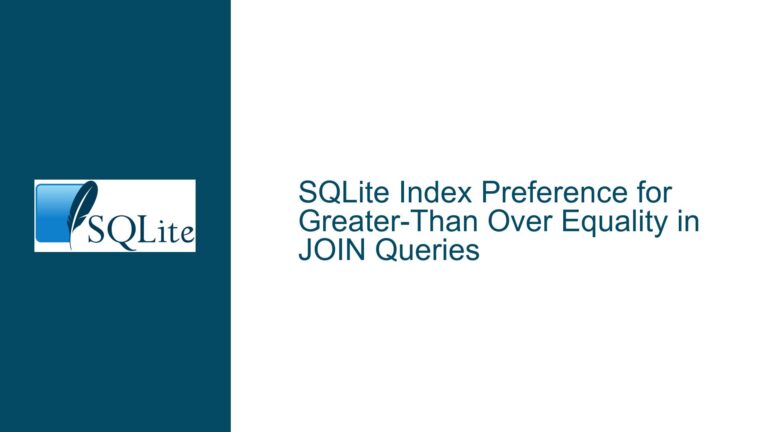Profile-Guided Optimization (PGO) Performance Discrepancies in SQLite Benchmarks
Issue Overview: Divergent Results in PGO-Driven SQLite Performance Improvements
The core issue revolves around conflicting observations regarding the effectiveness of Profile-Guided Optimization (PGO) when applied to SQLite. A user-reported benchmark demonstrates ~20% performance gains with PGO-enabled builds across multiple workloads, including the ClickBench suite and SQLite’s speedtest1 benchmark. These results directly contradict historical claims in SQLite’s documentation, which previously asserted that PGO provided negligible benefits. The discrepancy raises questions about:
- The validity of benchmarking methodologies (e.g., workload representativeness, compiler flag consistency).
- The role of compiler-specific PGO implementations (Clang vs. GCC).
- The interaction between PGO and SQLite’s internal optimizations (e.g., query planner heuristics, memory subsystem configurations).
Technical Context
- Profile-Guided Optimization (PGO) is a compiler technique that uses runtime profiling data to guide code generation. It involves two phases:
- Instrumentation Build: Compiling with flags (
-fprofile-generatefor GCC/Clang) to generate binaries that collect execution statistics. - Optimized Build: Recompiling with flags (
-fprofile-use) to apply profile data, enabling optimizations like hot/cold code separation, branch prediction hints, and function inlining.
- Instrumentation Build: Compiling with flags (
- SQLite’s Historical Position: Prior documentation (e.g.,
footprint.html) dismissed PGO due to perceived minimal gains, possibly based on older compiler versions or narrow test scenarios.
Key Observations from the Discussion
User-Reported Gains:
- ClickBench Workload: Total execution time reduced from 2614.5s (O3) to 2176.1s (PGO) – a 16.8% improvement.
speedtest1Benchmark:- Clang: 10.451s → 9.204s (11.9% faster).
- GCC: 10.123s → 9.140s (9.7% faster).
- Variability exists across individual queries (e.g., Query 100 in
speedtest1improved by 37% with Clang PGO).
Methodological Critiques:
- Initial results lacked structured presentation, complicating direct comparison.
- Concerns about whether the profiling workload (ClickBench) aligns with real-world SQLite usage patterns.
- Questions about compiler flag parity (e.g.,
-DSQLITE_ENABLE_MEMSYS5, heap sizing).
Documentation Revisions:
- SQLite’s maintainers removed PGO skepticism from
footprint.html, reflecting equipoise pending further validation.
- SQLite’s maintainers removed PGO skepticism from
Possible Causes of Discrepancies in PGO Efficacy
1. Workload-Specific Optimization Bias
PGO’s effectiveness hinges on the representativeness of the profiling workload. If the training data (e.g., ClickBench queries) exercises code paths dissimilar to SQLite’s default speedtest1 suite, optimizations may not generalize.
- Example: ClickBench emphasizes analytical queries (joins, aggregations), while
speedtest1stresses CRUD operations. PGO profiles derived from ClickBench might optimize B-tree traversal logic but neglect transaction journaling codepaths.
2. Compiler and Flag Configuration Divergence
- Compiler Version Sensitivity:
Older compilers (e.g., GCC <10, Clang <12) had less sophisticated PGO implementations. Modern compilers (GCC 13.1.1, Clang 16) leverage machine-learning-driven optimizations (e.g., AutoFDO). - Flag Inconsistencies:
- Missing
-fprofile-correctionin GCC builds could skew results with incomplete profiles. -fprofile-partial-training(used in GCC PGO) handles edge cases where profiling misses code paths, but improper use risks overfitting.
- Missing
3. Interaction with SQLite’s Intrinsic Optimizations
SQLite employs runtime adaptations (e.g., adaptive memory management, query plan caching) that may counteract or amplify PGO effects:
- Memory Subsystems: Enabling
SQLITE_ENABLE_MEMSYS5alters heap allocation patterns, potentially invalidating PGO’s branch predictions for memory-intensive operations. - Query Planner Heuristics: PGO-optimized binaries might hardcode decisions optimal for the profiling workload but suboptimal for unseen queries.
4. Measurement Artifacts
- Cold vs. Warm Cache Effects: Repeated benchmark runs (e.g., 3 trials per query) might skew results if filesystem/page caches are not purged between trials.
- Timer Granularity: Millisecond-level timings on Linux (
timecommand) introduce rounding errors, especially for sub-100ms operations.
5. Build Process Contamination
- Instrumentation Overhead Residuals: Failing to isolate instrumentation builds from production binaries (e.g., shared object caching) might taint profile data.
- Profile Data Misalignment: Using a
speedtest1-generated profile for ClickBench-optimized builds (or vice versa) creates mismatched optimization targets.
Troubleshooting Steps, Solutions & Fixes
Step 1: Validate Benchmarking Methodology
1.1 Standardize Workloads
- Reproduce SQLite’s Official
speedtest1:# Clone SQLite source git clone https://github.com/sqlite/sqlite cd sqlite # Build speedtest1 with instrumentation ./configure --enable-memsys5 make CFLAGS="-O3 -fprofile-generate" LDFLAGS="-fprofile-generate" speedtest1 # Generate profile data ./speedtest1 --shrink-memory --size 200 # Rebuild with PGO make clean make CFLAGS="-O3 -fprofile-use" LDFLAGS="-fprofile-use" speedtest1 - ClickBench Integration:
Ensure dataset (e.g.,hits_v1) is preloaded into SQLite to avoid I/O bottlenecks during profiling. UsePRAGMA journal_mode=WAL;for consistency.
1.2 Control Environmental Variables
- Disable CPU Frequency Scaling:
sudo cpupower frequency-set --governor performance - Isolate Caches:
Usedrop_caches(Linux) between runs:echo 3 | sudo tee /proc/sys/vm/drop_caches
1.3 Use High-Resolution Timing
Replace time with perf stat for cycle-accurate measurements:
perf stat -r 3 ./speedtest1 --size 200
Step 2: Diagnose Compiler and Profile Configuration
2.1 Audit Compiler Flags
- Clang:
Ensure-fprofile-instr-generate(instrumentation) and-fprofile-instr-use(optimization) are paired. - GCC:
Verify-fprofile-generate/-fprofile-usesymmetry. Include-fprofile-correctionto handle incomplete profiles.
2.2 Profile Data Sanity Checks
- Inspect
.profraw/.gcdaFiles:
Usellvm-profdata show(Clang) orgcov(GCC) to confirm profile coverage:llvm-profdata show -all-functions default.profraw - Check for Overfitting:
Comparespeedtest1profiles against ClickBench-derived profiles. Significant divergence indicates workload bias.
2.3 Cross-Validate with Alternative PGO Tools
- BOLT (Binary Optimization and Layout Tool):
Post-link optimizations can complement compiler PGO:llvm-bolt speedtest1 -o speedtest1.bolt --data=perf.fdata --reorder-blocks=cache+ \ --reorder-functions=hfsort+ --split-functions=3 --split-all-cold - AutoFDO:
Convertperfrecords into PGO profiles for GCC/Clang:create_llvm_prof --binary=speedtest1 --out=autofdo.prof --prof=perf.data
Step 3: Reconcile with SQLite’s Internal Optimization Mechanisms
3.1 Disable Adaptive Features During Profiling
- Fixed-Size Lookaside:
SetPRAGMA lookaside=OFFto eliminate runtime memory adjustments. - Static Page Cache:
ConfigureSQLITE_DEFAULT_PCACHE_INITSZandSQLITE_DEFAULT_CACHE_SIZEto match production values.
3.2 Profile Multiple Workload Phases
- Cold Start: Profile initial query execution (no cache).
- Steady State: Profile after 10+ iterations (warm cache).
- Mixed Workloads: Combine OLTP (INSERT/UPDATE) and OLAP (SELECT) queries in training data.
3.3 Analyze Assembly Output
Compare disassembly of hot functions (e.g., sqlite3VdbeExec) between PGO and non-PGO builds:
objdump -d sqlite3.o > sqlite3_pgo.asm
objdump -d sqlite3_nonpgo.o > sqlite3_nonpgo.asm
diff sqlite3_pgo.asm sqlite3_nonpgo.asm
Look for PGO-induced changes like:
- Loop Unrolling: Reduced branch mispredictions in
WHEREclause evaluation. - Function Reordering: Hot functions grouped into contiguous memory regions.
Step 4: Advocate for Documentation Updates
4.1 Publish Reproducible Benchmark Packages
- Dockerize Builds:
ProvideDockerfilewith pinned compiler versions, SQLite commits, and datasets:FROM ubuntu:22.04 RUN apt-get update && apt-get install -y clang-16 lld-16 git python3 RUN git clone https://github.com/sqlite/sqlite && cd sqlite && git checkout 831d0fb COPY hits_v1.csv /data/ WORKDIR /sqlite - Automate Benchmark Runs:
Use GitHub Actions or Jenkins to execute ClickBench/speedtest1on push.
4.2 Engage SQLite’s Performance Validation Suite
- Integrate with
TH3(Test Harness #3):
Extend SQLite’s internal test suite to include PGO vs. non-PGO comparisons. - Submit Pull Request:
Proposefootprint.htmlrevisions documenting PGO’s conditional efficacy, citing reproducible benchmarks.
4.3 Community Outreach
- Publish Case Studies:
Detail PGO’s impact on specific workloads (e.g., analytical vs. transactional) via Medium or SQLite’s forum. - Present at Conferences:
Advocate for PGO adoption in embedded databases through talks at events like SQLite Consortium meetings.
Final Recommendations
- Conditional PGO Adoption: Use PGO only when the production workload mirrors the profiling workload.
- Compiler Best Practices:
- Prefer Clang for PGO due to superior instrumentation tools (
llvm-profdata). - For GCC, enable
-fprofile-partial-trainingand-fprofile-correction.
- Prefer Clang for PGO due to superior instrumentation tools (
- Continuous Profiling: Integrate PGO into CI/CD pipelines to refresh profiles with evolving query patterns.
By addressing methodological rigor, compiler toolchain nuances, and SQLite’s adaptive internals, developers can harness PGO to achieve measurable performance gains while avoiding optimization pitfalls.
